Citroen C4 PICASSO RHD 2015 1.G Owner's Manual
Manufacturer: CITROEN, Model Year: 2015, Model line: C4 PICASSO RHD, Model: Citroen C4 PICASSO RHD 2015 1.GPages: 428, PDF Size: 10.09 MB
Page 171 of 428
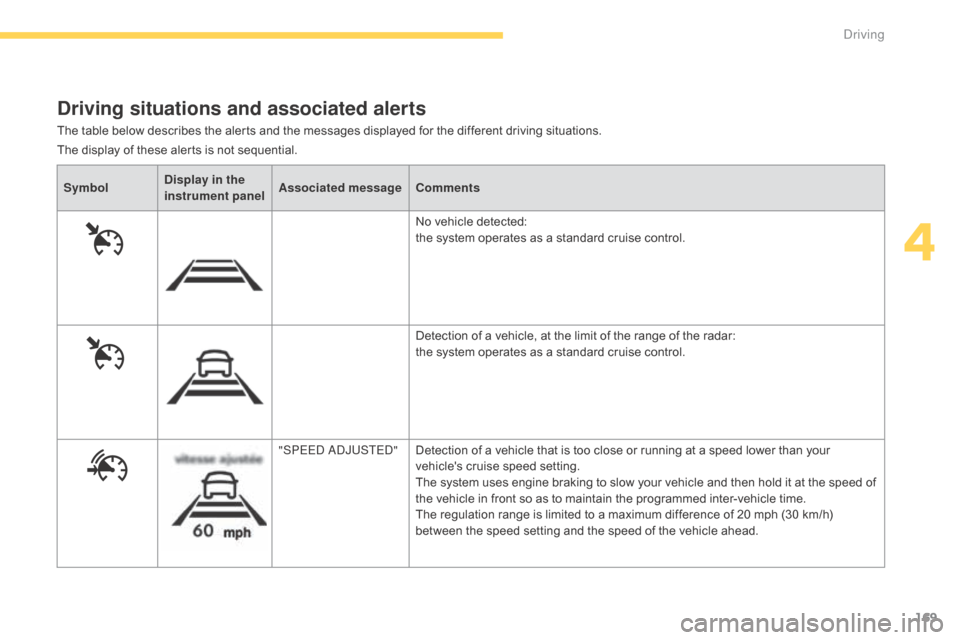
169
The table below describes the alerts and the messages displayed for the different driving situations.
Driving situations and associated alerts
The display of these alerts is not sequential.
S ymbol Display in the
instrument panel Associated message
Comments
No
vehicle detected:
t
he system operates as a standard cruise control.
Detection
of a vehicle, at the limit of the range of the radar:
t
he system operates as a standard cruise control.
"SPEE
d
ad
J
USTE
d"D
etection of a vehicle that is too close or running at a speed lower than your
v
ehicle's cruise speed setting.
The
system uses engine braking to slow your vehicle and then hold it at the speed of
t
he vehicle in front so as to maintain the programmed inter-vehicle time.
The
regulation range is limited to a maximum difference of 20 mph (30 km/h)
b
etween the speed setting and the speed of the vehicle ahead.
4
Driving
Page 172 of 428
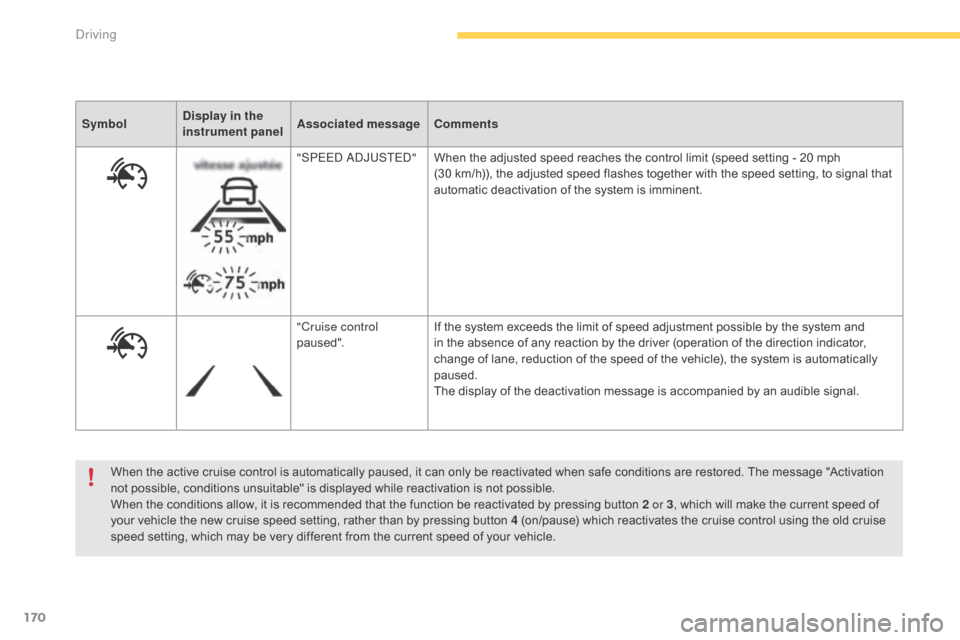
170
When the active cruise control is automatically paused, it can only be reactivated when safe conditions are restored. The message "Activation not possible, conditions unsuitable" is displayed while reactivation is not possible.
When
the conditions allow, it is recommended that the function be reactivated by pressing button 2 or 3,
which will make the current speed of
y
our vehicle the new cruise speed setting, rather than by pressing button 4 (on/pause) which reactivates the cruise control using the old cruise
s
peed setting, which may be very different from the current speed of your vehicle.
Symbol
Display in the
instrument panel Associated message
Comments
"SPEE
d
ad
J
USTE
d"
W
hen the adjusted speed reaches the control limit (speed setting - 20 mph
(
30 km/h)), the adjusted speed flashes together with the speed setting, to signal that
a
utomatic deactivation of the system is imminent.
"Cruise control
paused". If the system exceeds the limit of speed adjustment possible by the system and
i
n the absence of any reaction by the driver (operation of the direction indicator,
c
hange of lane, reduction of the speed of the vehicle), the system is automatically
pa
used.
The display of the deactivation message is accompanied by an audible signal.
Driving
Page 173 of 428

171
The active cruise control uses only engine braking to slow the vehicle. Consequently the
v
ehicle looses speed slowly, as when releasing
t
he accelerator pedal.
The
system is paused automatically:
-
i
f the vehicle in front slows down to much
o
r too suddenly, and the driver does not
b
rake,
-
i
f a vehicle comes between your vehicle
a
nd the vehicle in front,
-
i
f the system does not slow the vehicle
e
nough to continue to maintain a safe
d
istance, for example when descending a
s
teep hill.
Limits of operation
As the radar's field of view is quite narrow, it is possible that the system may not detect:
The
cruise control does not take account of:
-
s
tationary vehicles,
-
v
ehicles driving in the opposite direction.
-
v
ehicles of reduced width, such as
m
otorcycles, for example,
-
v
ehicles not running in the middle of
t
he
lane, -
v
ehicles entering a corner,
-
v
ehicles changing lane at the last moment.
The
regulation
range
is
limited
to
a
maximum
d
ifference
of
20
mph
(30
km/h)
between
the
s
peed
setting
and
the
speed
of
the
vehicle
a
head.
Above
this,
the
system
goes
into
pause
i
f
a
safe
distance
is
not
maintained.
Severe
weather
conditions
(very
heavy
r
ain,
accumulations
of
snow
in
front
o
f
the
radar)
can
inter fere
with
the
o
peration
of
the
system,
resulting
in
t
he
display
of
the
message
"SYSTEM
I
NACTIVE:
Visibility
reduced".
The
f
unction
remains
unavailable
until
the
m
essage
d
isappears.
4
Driving
Page 174 of 428
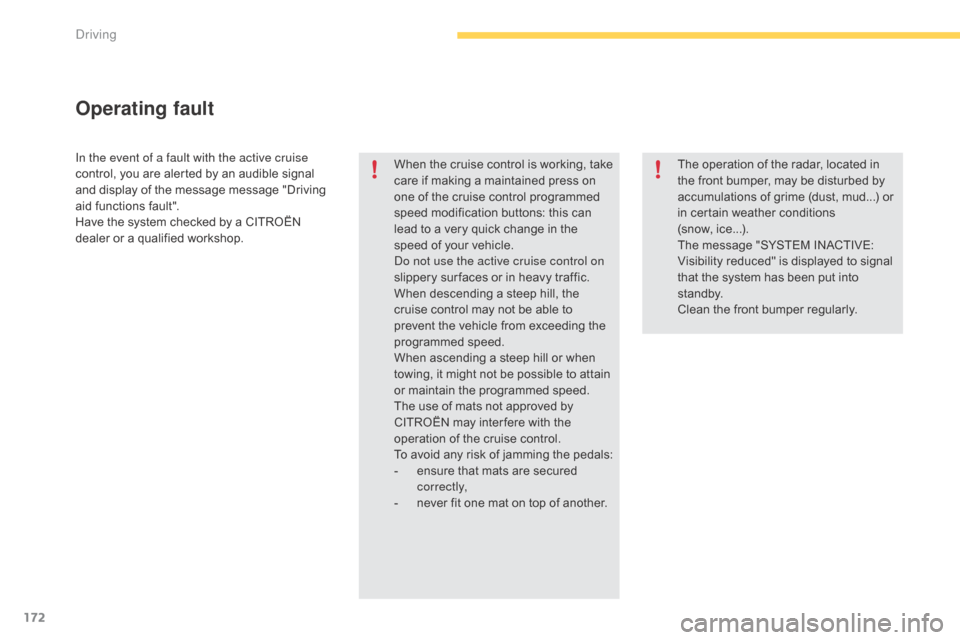
172
In the event of a fault with the active cruise
control, you are alerted by an audible signal
a
nd display of the message message "Driving
a
id functions fault".
Have
the system checked by a CITROËN
d
ealer or a qualified workshop. When
the cruise control is working, take
c
are if making a maintained press on
o
ne of the cruise control programmed
s
peed modification buttons: this can
l
ead to a very quick change in the
s
peed of your vehicle.
do n
ot use the active cruise control on
slippery
sur faces or in heavy traffic.
When
descending a steep hill, the
c
ruise control may not be able to
p
revent the vehicle from exceeding the
pro
grammed
s
peed.
When
ascending a steep hill or when
t
owing, it might not be possible to attain
o
r maintain the programmed speed.
The
use of mats not approved by
C
ITROËN may inter fere with the
o
peration of the cruise control.
To
avoid any risk of jamming the pedals:
-
e
nsure that mats are secured
c
o r r e c t l y,
-
n
ever fit one mat on top of another.
Operating fault
The operation of the radar, located in the front bumper, may be disturbed by
a
ccumulations of grime (dust, mud...) or
i
n certain weather conditions
(snow,
i
ce...).
The
message "SYSTEM INACTIVE:
V
isibility reduced" is displayed to signal
t
hat the system has been put into
s
t a n dby.
Clean
the front bumper regularly.
driving
Page 175 of 428
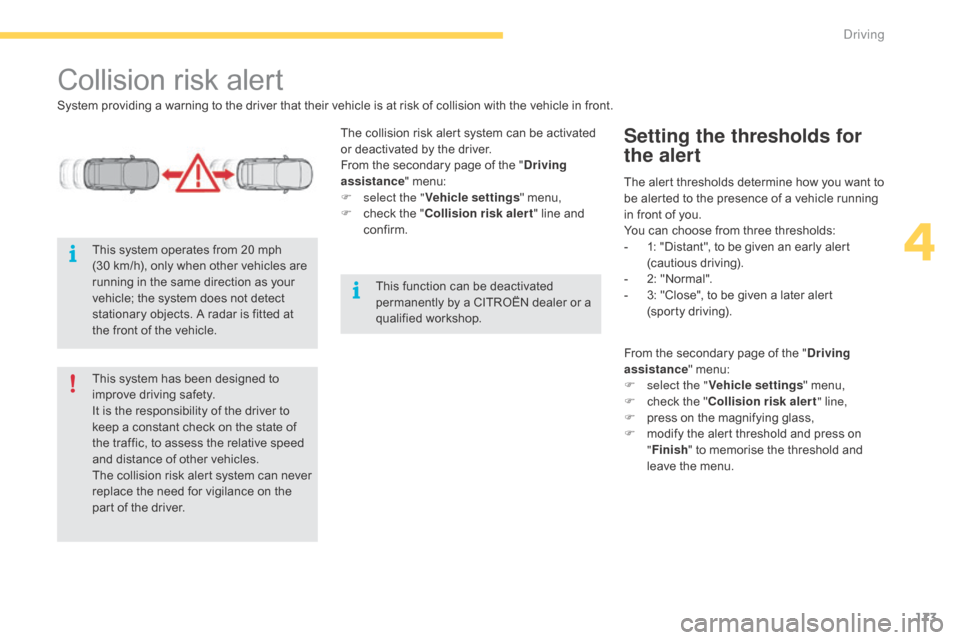
173
Collision risk alert
System providing a warning to the driver that their vehicle is at risk of collision with the vehicle in front.
T he collision risk alert system can be activated
o
r deactivated by the driver.
From
the secondary page of the "Driving
assistance "
menu:
F
s
elect the "Vehicle settings "
menu,
F
c
heck the "Collision risk alert "
line and
c
onfirm.
This
system has been designed to
i
mprove driving safety.
It
is the responsibility of the driver to
k
eep a constant check on the state of
t
he traffic, to assess the relative speed
a
nd distance of other vehicles.
The
collision risk alert system can never
r
eplace the need for vigilance on the
p
art of the driver.
This
system operates from 20 mph
(
30 km/h), only when other vehicles are
r
unning in the same direction as your
v
ehicle; the system does not detect
s
tationary objects. A radar is fitted at
t
he front of the vehicle. The
alert thresholds determine how you want to
b
e alerted to the presence of a vehicle running
i
n front of you.
You
can choose from three thresholds:
-
1
: "Distant", to be given an early alert
(
cautious
d
riving).
-
2
: "Normal".
-
3
: "Close", to be given a later alert
(sporty
driving).
Setting the thresholds for
the alert
This function can be deactivated permanently by a CITROËN dealer or a
q
ualified
w
orkshop.
From
the secondary page of the "Driving
assistance "
menu:
F
s
elect the "Vehicle settings "
menu,
F
c
heck the "Collision risk alert " line,
F
p
ress on the magnifying glass,
F
m
odify the alert threshold and press on
"F
inish"
to memorise the threshold and
l
eave the menu.
4
Driving
Page 176 of 428
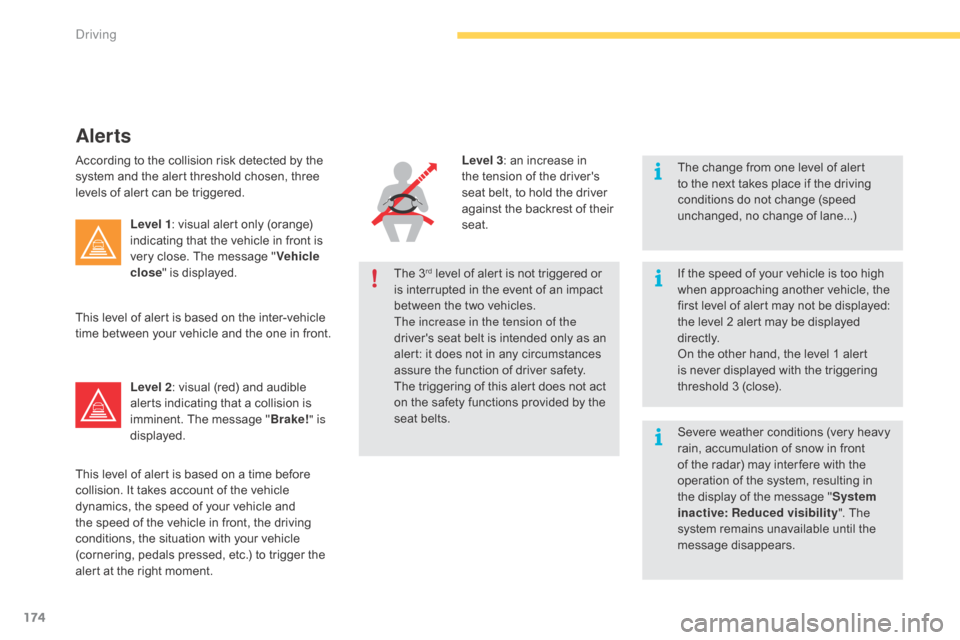
174
The change from one level of alert to the next takes place if the driving
c
onditions do not change (speed
u
nchanged, no change of lane...)
Severe
weather conditions (very heavy
r
ain, accumulation of snow in front
o
f the radar) may inter fere with the
o
peration of the system, resulting in
t
he display of the message "System
inactive: Reduced visibility ".
The
s
ystem remains unavailable until the
m
essage
d
isappears.
If
the speed of your vehicle is too high
w
hen approaching another vehicle, the
f
irst level of alert may not be displayed:
t
he level 2 alert may be displayed
d
i r e c t l y.
On
the other hand, the level 1 alert
i
s never displayed with the triggering
t
hreshold 3 (close).
Alerts
According to the collision risk detected by the system and the alert threshold chosen, three
l
evels of alert can be triggered.
Level 1 :
visual alert only (orange)
i
ndicating that the vehicle in front is
v
ery close. The message "Vehicle
close "
is displayed.
Level 2 :
visual (red) and audible
a
lerts indicating that a collision is
i
mminent. The message "Brake! " is
displayed.
This
level of alert is based on the inter-vehicle
t
ime between your vehicle and the one in front.
This
level of alert is based on a time before
c
ollision. It takes account of the vehicle
d
ynamics, the speed of your vehicle and
t
he speed of the vehicle in front, the driving
c
onditions, the situation with your vehicle
(
cornering, pedals pressed, etc.) to trigger the
a
lert at the right moment. Level 3
: an increase in t
he tension of the driver's
s
eat belt, to hold the driver
a
gainst the backrest of their
sea
t.
The
3
rd level of alert is not triggered or i
s
interrupted in the event of an impact
b
etween the two vehicles.
The increase in the tension of the
driver's
seat belt is intended only as an
a
lert:
it
does not in any circumstances
a
ssure
the function of driver safety.
The
triggering of this alert does not act
o
n
the
safety functions provided by the
s
eat
belts.
Driving
Page 177 of 428
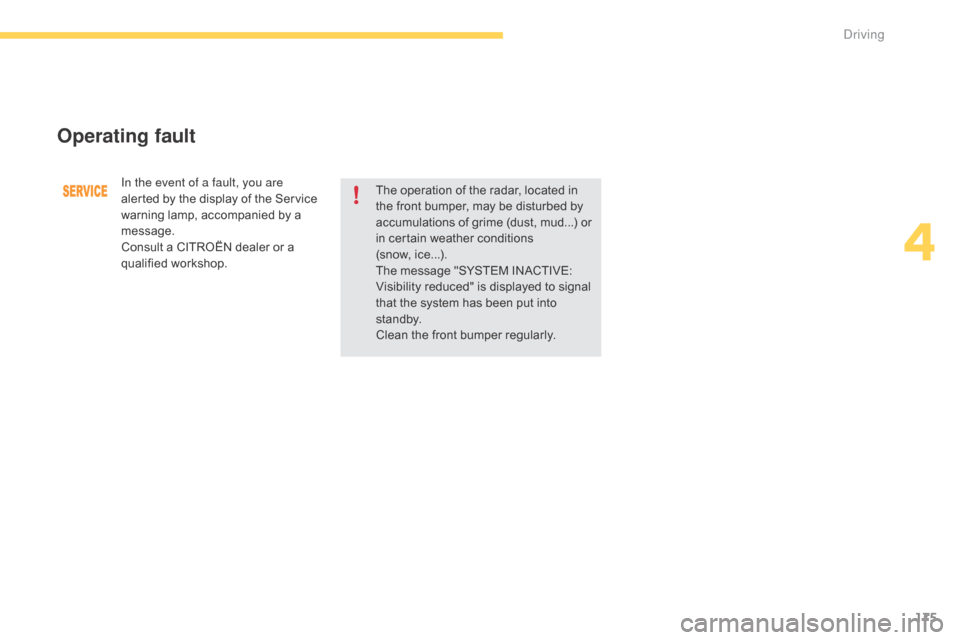
175
Operating fault
In the event of a fault, you are
alerted by the display of the Service
w
arning lamp, accompanied by a
m
essage.
Consult
a CITROËN dealer or a
q
ualified
w
orkshop. The
operation of the radar, located in
t
he front bumper, may be disturbed by
a
ccumulations of grime (dust, mud...) or
i
n certain weather conditions
(snow,
i
ce...).
The
message "SYSTEM INACTIVE:
V
isibility reduced" is displayed to signal
t
hat the system has been put into
s
t a n dby.
Clean
the front bumper regularly.
4
Driving
Page 178 of 428
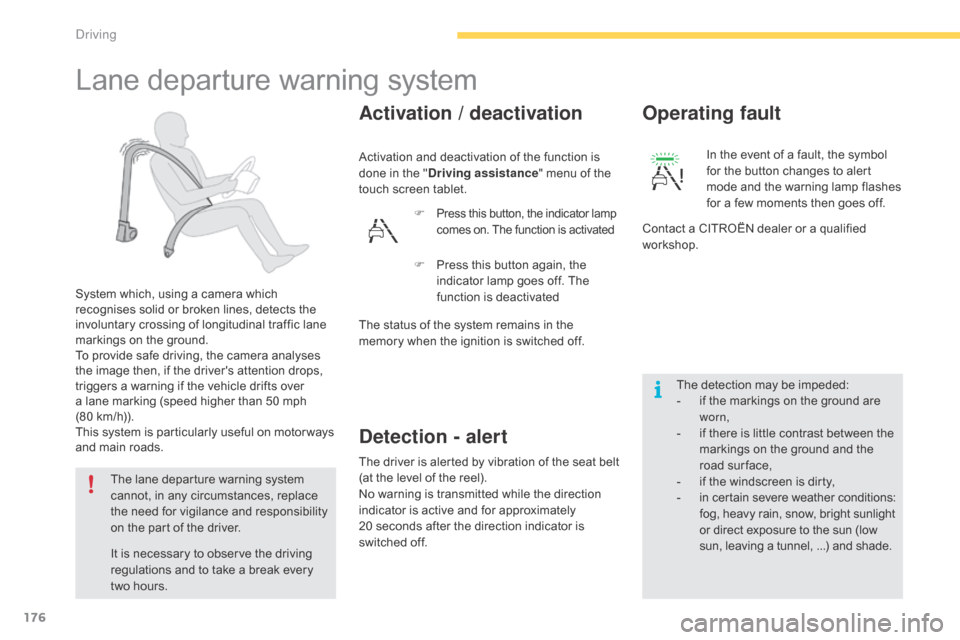
176
Lane departure warning system
System which, using a camera which recognises solid or broken lines, detects the
i
nvoluntary crossing of longitudinal traffic lane
m
arkings on the ground.
To
provide safe driving, the camera analyses
t
he image then, if the driver's attention drops,
t
riggers a warning if the vehicle drifts over
a
lane marking (speed higher than 50 mph
(
80 km/h)).
This
system is particularly useful on motor ways
a
nd main roads. Activation
and deactivation of the function is
d
one in the "
Driving assistance " menu of the
t
ouch screen tablet.
Activation / deactivation
The driver is alerted by vibration of the seat belt (
at the level of the reel).
No
warning is transmitted while the direction
i
ndicator is active and for approximately
2
0 seconds after the direction indicator is
s
witched off.
Detection - alert
The lane departure warning system cannot, in any circumstances, replace
t
he need for vigilance and responsibility
o
n the part of the driver. F
Press this button, the indicator lamp c
omes on. The function is activated
The detection may be impeded:
- i f the markings on the ground are
w
orn,
-
i
f there is little contrast between the
m
arkings on the ground and the
r
oad sur face,
-
i
f the windscreen is dirty,
-
i
n
c
ertain
se
vere
w
eather
c
onditions:
f
og, heavy rain, snow, bright sunlight
o
r direct exposure to the sun (low
s
un, leaving a tunnel, ...) and shade.
In
the event of a fault, the symbol
f
or the button changes to alert
m
ode and the warning lamp flashes
f
or a few moments then goes off.
Operating fault
Contact a CITROËN dealer or a qualified w
orkshop.
The
status
of
the
system
remains
in
the
m
emory
when
the
ignition
is
switched
off.
It
is
necessary
to
observe
the
driving
r
egulations
and
to
take
a
break
every
t
wo
hours. F
P
ress
this
button
again,
the
i
ndicator
lamp
goes
off.
The
f
unction
is
deactivated
Driving
Page 179 of 428
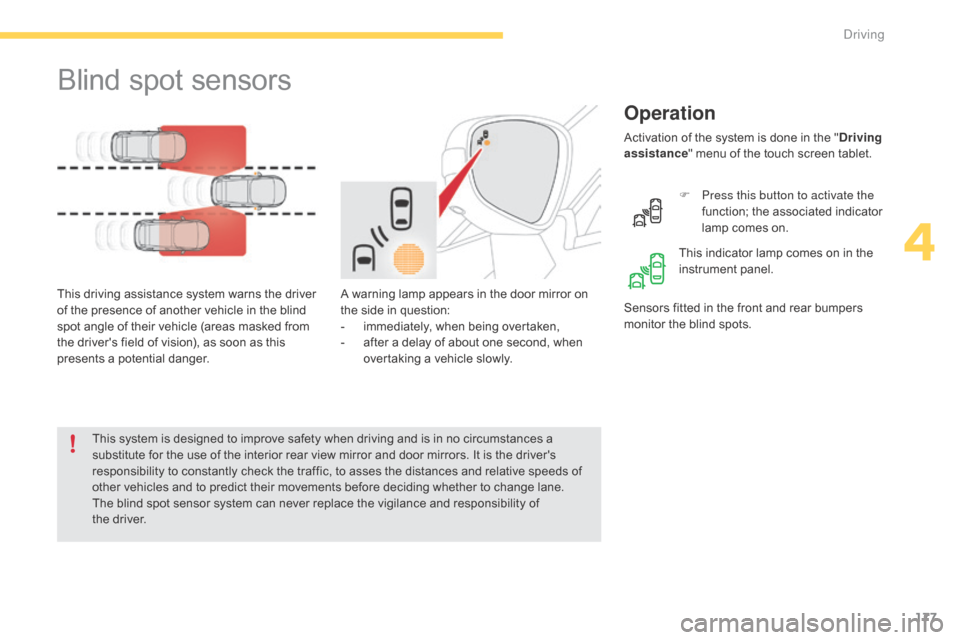
177
Blind spot sensors
Operation
A warning lamp appears in the door mirror on the side in question:
-
i
mmediately, when being overtaken,
-
a
fter a delay of about one second, when
ov
ertaking a vehicle slowly.
This
driving
assistance
system
warns
the
driver
o
f
the
presence
of
another
vehicle
in
the
blind
s
pot
angle
of
their
vehicle
(areas
masked
from
t
he
driver's
field
of
vision),
as
soon
as
this
p
resents
a
potential
danger. Sensors
fitted in the front and rear bumpers
m
onitor the blind spots.
This
system
is
designed
to
improve
safety
when driving and is in no circumstances a
s
ubstitute
for
the
use
of
the
interior
rear
view
mirror and door mirrors. It is the driver's
r
esponsibility
to
constantly
check
the
traffic,
to asses the distances and relative speeds of
o
ther
vehicles
and
to
predict
their
movements before deciding whether to change lane.
The
blind
spot
sensor
system
can
never
replace the vigilance and responsibility of
t
he driver. Activation
of the system is done in the "
Driving
assistance " menu of the touch screen tablet.
F
P
ress this button to activate the
function; the associated indicator
l
amp comes on.
This indicator lamp comes on in the
in
strument
pan
el.
4
Driving
Page 180 of 428
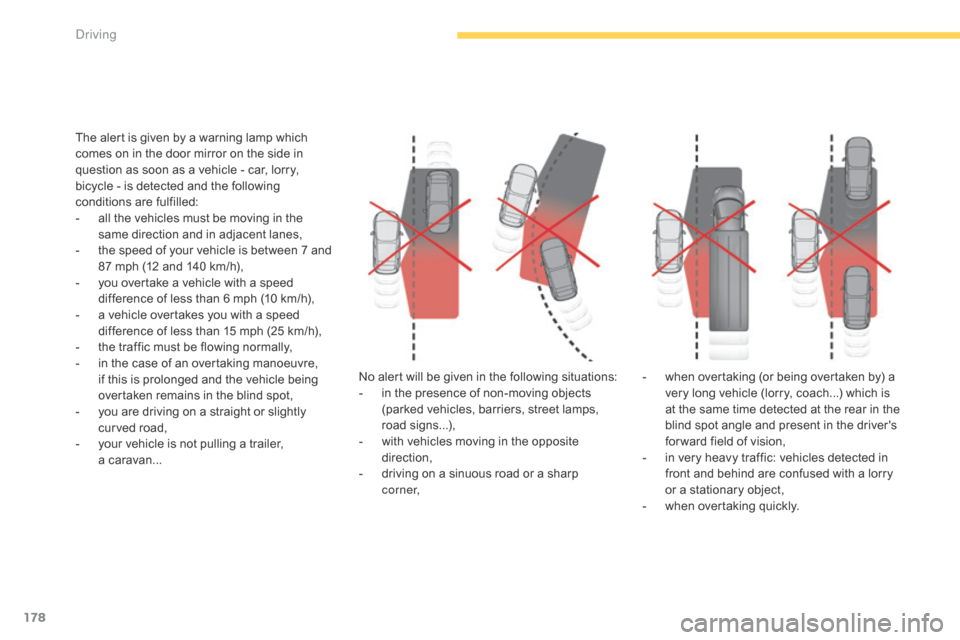
178
The alert is given by a warning lamp which comes on in the door mirror on the side in
q
uestion as soon as a vehicle - car, lorry,
b
icycle - is detected and the following
c
onditions are fulfilled:
-
a
ll the vehicles must be moving in the
s
ame direction and in adjacent lanes,
-
t
he speed of your vehicle is between 7 and
87
mph (12 and 140 km/h),
-
y
ou overtake a vehicle with a speed
d
ifference of less than 6 mph (10 km/h),
-
a
vehicle overtakes you with a speed
d
ifference of less than 15 mph (25 km/h),
-
t
he traffic must be flowing normally,
-
i
n the case of an overtaking manoeuvre,
i
f this is prolonged and the vehicle being
ov
ertaken remains in the blind spot,
-
y
ou are driving on a straight or slightly
c
urved road,
-
y
our vehicle is not pulling a trailer,
a
caravan... No
alert will be given in the following situations:
-
i
n the presence of non-moving objects
(
parked vehicles, barriers, street lamps,
r
oad
s
igns...),
-
w
ith vehicles moving in the opposite
d
irection,
-
d
riving on a sinuous road or a sharp
c
o r n e r,-
w
hen overtaking (or being overtaken by) a
v
ery long vehicle (lorry, coach...) which is
a
t the same time detected at the rear in the
b
lind spot angle and present in the driver's
f
or ward field of vision,
-
i
n very heavy traffic: vehicles detected in
f
ront and behind are confused with a lorry
o
r a stationary object,
-
w
hen overtaking quickly.
driving